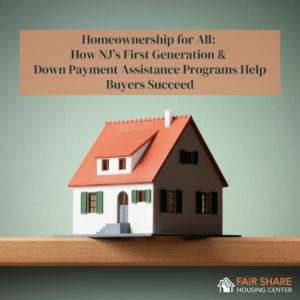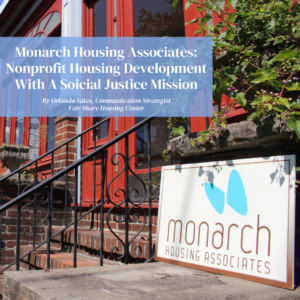Housing Must be a Fiscal Year 2024 Budget Priority for New Jersey
February 16th, 2023
By James C. Williams IV
Fair Share Housing Center has advocated for housing justice since its founding in 1975. As housing needs and wealth disparities in New Jersey continue to grow, so does the need for increased investments in the state’s housing infrastructure. To that end, New Jersey’s Fiscal Year 2024 Budget should build on investments the state has already made to advance affordable housing development and protections throughout 2022, including the $305 million budget allocation in the FY23 budget. This year, Fair Share Housing Center is calling on Governor Murphy and the Legislature to invest in the continued enforcement of anti-discriminatory housing policies, expand access to homeownership opportunities, and support the need to sustain and preserve the state’s urban housing inventory. Making concrete, holistic investments in housing, not just in construction, needs to be a consistent component of budgetary priorities, as does identifying housing allocations that mitigate health determinants, create generational wealth, and dismantle systemic barriers of racism in housing.
New Jersey is one of the most racially divided states in the nation. Access to housing continues to be one of the most preeminent factors within that divide. Tenant screening policies—including those that review individuals’ prior criminal history, past eviction filings, credit scores, and sources of income—create barriers that disproportionately prevent Black and Brown residents from accessing housing. In 2022, the Division on Civil Rights established a specialized unit dedicated to educating the public on and investigating housing discrimination, including violations of the Fair Chance in Housing Act (FCHA). The unit was supported with $3 million from American Rescue Plan funds to address housing discrimination issues magnified by COVID-19. For New Jersey to make meaningful strides in ending housing discrimination throughout the state, policymakers must provide additional funding to the Division on Civil Rights to add staff to investigate violations of the FCHA and other forms of housing discrimination. Fair Share Housing Center recommends an appropriation of at least $20 million to the Division on Civil Rights for staffing, program development, and department expansion.
While Fair Share Housing Center continues to advocate for inclusive communities and affordable rental opportunities, the fight for fair housing must also include homeownership opportunities. Homeownership is one of the primary ways to build intergenerational wealth, and in New Jersey, wealth disparities by race are staggering. To truly make an impact on the racial wealth gap, New Jersey must make homeownership more attainable for Black and brown individuals and families. Communities of color face tremendous difficulties gaining access to homeownership for various reasons, including a lack of resources for a down payment, poor credit history, lack of homeownership education, and changing housing markets in historic urban areas. To address these concerns, Fair Share Housing Center recommends the establishment of a first-generation homeownership program—like that envisioned in Senator Singleton’s Dream Act (Senate Bill 242/Assembly Bill 3661) from the last legislative session. Such a program could include housing education seminars and access to housing navigators for application assistance, in addition to providing down payment assistance to first-generation homeowners in areas where home values are appreciating rather than depreciating. We recommend a $25 million investment for an initial First-Generation Homeownership Pilot program. New Jersey currently has a First Time Homeownership Program but still sees vast disparities between Black and white homeowners. Creating a First-Generation Home Ownership Program would be an intentional effort address the homeownership gap between people of color and whites.
Additionally, Sen. Singleton introduced legislation to create a first-time home buyers’ savings program, S335, that can serve as a pilot model for first-generation home buyers to receive either a one-time state investment or a match for those who qualify. Fair Share Housing Center believes a $5 million allocation could serve first-time home buyers well, with the hope of them not being a part of our leading national foreclosure ranking. A carefully crafted program that would provide a savings account with state-invested funds to mitigate home repair issues or other unforeseen expenses can protect first-generation homeowners from having to choose between addressing household needs or paying their mortgage.
While Fair Share Housing Center is appreciative to the Governor and Legislature for allocating $305 million towards the development of affordable housing in last year’s budget, the investment did nothing to address the roughly 34,000 affordable homes that could come offline if the state does not act swiftly to preserve and maintain our existing public housing inventory, most of which is in urban localities. Public Housing Authorities are in dire need of funding to provide critical updates to units that have become uninhabitable. We recommend that $500 million be directed towards urban housing maintenance and sustainment, with priority given to the homes most at risk of coming offline in the next five to ten years.
Finally, Fair Share Housing Center recommends that an additional $60 million be allocated to replenish the Affordable Housing Production Fund (AHPF). This year, $60 million from the initial appropriation of $305 million to this fund was used to complete other projects that needed additional monies due to rising interest rates and supply chain issues. To hold true to the commitment of developing 3,300 new and 100% affordable homes, $60 million must be appropriated to replenish this fund.
The annual state budget is an important tool in repairing decades of harm to communities of color. Making intentional investments in programs and policies that will positively benefit Black and brown individuals and families must be an annual budget priority. If New Jersey truly wants its budget to reflect the needs of its diverse population, then it must center and weave reparative investments throughout the budget, rather than relegate those payments to a one-time financial payout. The needs of communities of color will never be met with a single check, but through regular and intentional allocations that look to right generations of societal wrongs.
Governor Murphy and the Legislature have an opportunity to use the FY24 budget to invest in meaningful change and become national leaders in addressing housing crisis. We look forward to working with them on a path towards housing justice for all.






